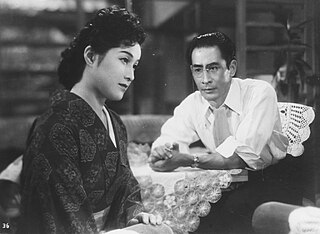 W
WThe 47 Ronin is a black-and-white two-part jidaigeki Japanese film directed by Kenji Mizoguchi, adapted from a play by Seika Mayama. The first part was released on December 1, 1941 with the second part being released on February 11 of the following year. The film depicts the legendary forty-seven Ronin and their plot to avenge the death of their lord, Asano Naganori, by killing Kira Yoshinaka, a shogunate official responsible for Asano being forced to commit seppuku.
 W
WAizō Tōge is a 1934 black-and-white Japanese film directed by Kenji Mizoguchi. It is a lost film.
 W
WThe Crucified Lovers is a 1954 Japanese film directed by Kenji Mizoguchi. It was adapted from Monzaemon Chikamatsu's 1715 bunraku play Daikyōji mukashi goyomi. The film was presented at the 1955 Cannes Film Festival,
 W
WOrizuru Osen (折鶴お千) is a 1935 black and white Japanese silent film directed by Kenji Mizoguchi, starring Isuzu Yamada. It is based on Kyōka Izumi's novel Baishoku Kamo Nanban.
 W
WA Geisha is a 1953 Japanese film directed by Kenji Mizoguchi, centred on life in post-war Gion, Kyoto, through the relationship between an established geisha, Miyoharu, and teenaged Eiko, who pleads with Miyoharu to take her on as an apprentice geisha, or maiko. The film is based on the novel by Matsutarō Kawaguchi, who also produced the screenplay.
 W
WThe Lady of Musashino is a 1951 Japanese film directed by Kenji Mizoguchi. The script for the film was adapted by Mizoguchi from the best-selling serial novel by Shōhei Ōoka.
 W
WThe Life of Oharu is a 1952 Japanese historical fiction film directed by Kenji Mizoguchi from a screenplay by Yoshikata Yoda. It stars Kinuyo Tanaka as Oharu, a one-time concubine of a daimyō who struggles to escape the stigma of having been forced into prostitution by her father.
 W
WMiss Oyu is a 1951 black-and-white Japanese drama film directed by Kenji Mizoguchi. It is based on the 1932 novella The Reed Cutter (Ashikari) by Jun'ichirō Tanizaki.
 W
WOsaka Elegy is a 1936 Japanese film directed by Kenji Mizoguchi. Mizoguchi considered the film his first serious effort as a director, and it was also his first commercial and critical success in Japan. Osaka Elegy is often considered a companion piece to Mizoguchi's next film, Sisters of the Gion, which was released the same year and featured much the same cast and crew.
 W
WPortrait of Madame Yuki , also titled A Picture of Madame Yuki, is a 1950 Japanese drama film directed by Kenji Mizoguchi.
 W
WPrincess Yang Kwei Fei is a 1955 Japanese film directed by Kenji Mizoguchi. It was a co-production between Daiei Film and Hong Kong's Shaw & Sons, a predecessor of Shaw Brothers Studio. It is one of Mizoguchi's two color films, the other being Tales of the Taira Clan, made the same year.
 W
WSansho the Bailiff is a 1954 Japanese period film directed by Kenji Mizoguchi. Based on a 1915 short story of the same name by Mori Ōgai, which in turn was based on a folktale, it follows two aristocratic children who are sold into slavery.
 W
WShin Heike Monogatari is a 1955 Japanese film directed by Kenji Mizoguchi. It is based on a prose version by Eiji Yoshikawa of a Japanese epic poem, The Tale of the Heike. It is Mizoguchi's second and last film in color, the other being Princess Yang Kwei Fei (Yōkihi) of the same year.
 W
WSisters of the Gion or Sisters of Gion is a 1936 black and white Japanese drama film directed by Kenji Mizoguchi about two geisha sisters living in Kyoto's Gion district. It forms a diptych with Mizoguchi's Osaka Elegy which shares much of the same cast and production team.
 W
WThe Story of the Last Chrysanthemums , also translated as The Story of the Last Chrysanthemum and The Story of the Late Chrysanthemums, is a 1939 Japanese film directed by Kenji Mizoguchi, about a male actor specialising in playing female roles in late 19th century Japan.
 W
WStreet of Shame is a 1956 black-and-white Japanese film directed by Kenji Mizoguchi. It is the personal tales of several Japanese women of different backgrounds who work together in a brothel. It was Mizoguchi's last film.
 W
WTojin Okichi is a 1930 film by Kenji Mizoguchi based on the novel by Gisaburo Juichiya.
 W
WTokyo March is a 1929 black and white Japanese silent film, originally presented with benshi accompaniment, directed by Kenji Mizoguchi. It is a classic melodramatic love story addressing social inequality in modern Japan, depicted in Mizoguchi's typical style. The theme song "Tokyo March" was originally sung by Chiyako Sato.
 W
WUgetsu, also known as Tales of Ugetsu, The Tales of the Wave after the Rain Moon and Ugetsu Monogatari (雨月物語), is a 1953 Japanese romantic fantasy drama directed by Kenji Mizoguchi and based on stories in Ueda Akinari's 1776 book of the same name. It is a ghost story and an example of the jidaigeki genre, starring Masayuki Mori and Machiko Kyō.
 W
WThe Water Magician is a 1933 black and white Japanese silent film directed by Kenji Mizoguchi and based on a story by Kyōka Izumi. It is one of the most popular titles from the silent film work of Mizoguchi and tells a tragic love story which realistically depicts the beauty and strength of the women of the Meiji period. It is currently available with benshi accompaniment.
 W
WThe Woman in the Rumor is a 1954 black-and-white Japanese film directed by Kenji Mizoguchi.